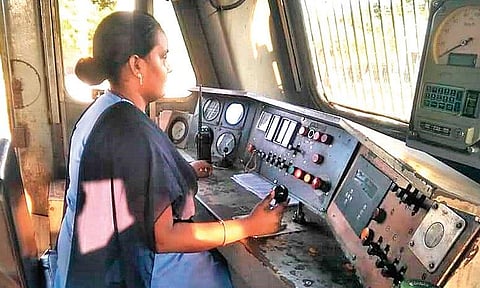

VIJAYAWADA: Ch Sireesh is of the opinion that her journey would have been more arduous had she been the first woman loco pilot in the country, instead of Vijayawada division’s.
"I started working in 2013 and, by then, the mindset of people had improved a lot. However, I feel if I was the first woman loco pilot in the country instead of Surekha Yadav in 1988, I might have been subjected to harsh treatment," she says.
Stating that she does not face any bullying or attitude problems from her male colleagues, the 27-year-old says: "I wanted to become a soldier. But when I saw moving trains in my youth, it made me curious to know how can they run without taking any break. When I learnt their functioning, I thought that a loco pilot was no less than a soldier. The army personnel take care of the country in borders, whereas we take care of citizens’ travel needs, without which globalisation was not possible."
Sireesh is a diploma graduate in electronics and communication engineering and began her journey as an assistant loco pilot in Visakhapatnam in 2013. In just five years, she was promoted to senior loco pilot in Vijayawada division.
Ramana, who works as a sweeper for the Vijayawada Municipal Corporation, is also of the opinion that the society’s approach towards women has changed over the decades.
"Indian women have been traditionally associated with household works. When I was a child, my mother’s only aim was to teach me how to cook. We were never seen as a member of the family who can earn or support our families financially. However, over a period of time, people’s perception towards us has changed after several public demonstrations, outrages and social movements," says the 50-year-old.
Ramana has been working in night shifts for the last 17 years. "In the day, my husband goes to work and I take care of our children. I work from 10 pm to 6 am," she adds.
"People had negative notions about me and my work as my working hours, according to them, were not normal for a woman. But as time went by, it became difficult to sustain my family with one salary. They understand now that I work only to support my family and give my children a better life," she observes.
Polavarapu Annapurna, who runs a tiffin service, also had a similar experience. "My husband and mother-in-law were completely against me working after marriage. I am an Arts graduate, but wasted several years in convincing them to let me either study further or work. It was only in 2017 that my husband agreed that I start my own business, mainly because I run it from home."
However, she questions why do women need men’s permission for anything. On the eve of the International Women’s Day, all women TNIE spoke to wished that they be given opportunities on par with men and that they get to share the emotional and financial responsibilities to better sustain their families.